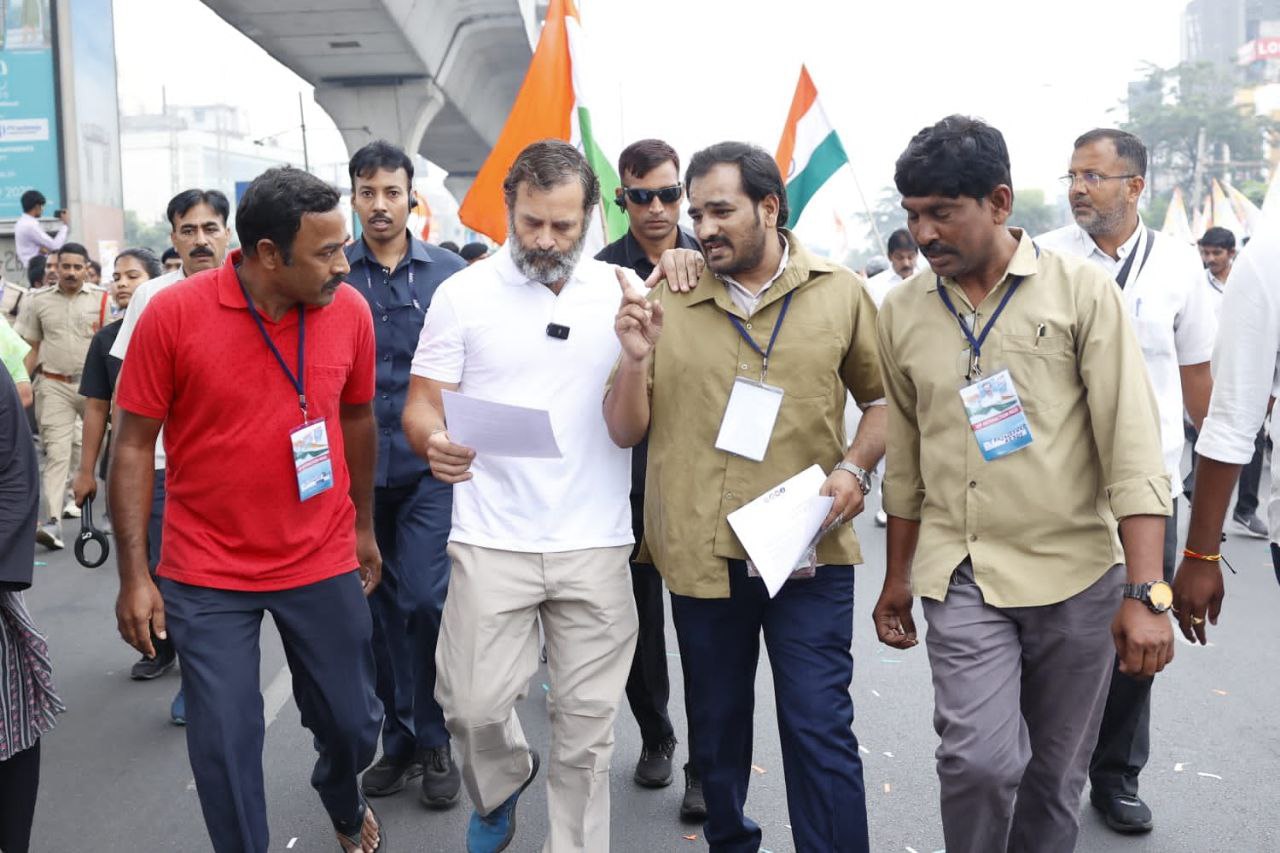TGPWU’s Founder and President Shaik Salauddin presented a list of gig and platform workers’ grievances and demands to Shri Rahul Gandhi Ji on November 2nd in Hyderabad, during the Congress Leader’s ‘Bharat Jodo Yatra’.
The full text of TGPWU’s policy submission is below:
TGPWU Position Paper: Major Issues faced by Indian Gig and Platform Workers
The Indian platform economy is large, and is rapidly growing. As noted in NITI Aayog’s recent (2022) report ‘India’s Booming Gig and Platform Economy’, there are an estimated 77 lakh (7.7 million) workers engaged in the platform economy in 2020–21, constituting 2.6% of the non-agricultural workforce or 1.5% of the total workforce in India. The platform workforce is expected to expand to 2.35 crore (23.5 million) workers by 2029–30, or 6.7% of the non-agricultural workforce or 4.1% of the total livelihood in India by 2029–30. Moreover, the digitally-mediated piece work model that digital platforms like Uber, Swiggy and Urban Company employ is being deployed in evermore sectors of the economy, becoming a defining and permanent characteristic of how work is organised in India.
The COVID-19 pandemic has provided great stimulus to this ‘future of work’ in India. On-demand services are experiencing a moment of expansion, which the COVID-19 pandemic has contributed to. For cities in quarantine, gig and platform workers facilitated the supply of food, medicine and other primary goods to middle and upper class consumers who were sheltering in their homes. In doing this, workers faced heightened exposure to the deadly virus, due to having to navigate public spaces for their work. This new class of gig and platform workers provided essential services during this period of devastating crisis at great personal risk, and are deserving of attention and care from digital platforms and government alike.
However this future of work has brought with it exploitation for the very workers on whose shoulders it is being built. While gig and platform work is commonly described as the ‘future’ of work, platform workers have low earnings, face poor and risky working conditions, and fall outside the scope of Indian labour laws and protections.
Below, we highlight the salient aspects of Indian gig and platform workers’ experiences and needs:
1. Workers face challenges due to the Terms of Contract set unilaterally by digital platforms. Working conditions on digital platforms are largely regulated solely by the terms of service agreements that platform companies unilaterally determine, and that workers have to agree to before they can begin work, usually by checking a box on the app screen. These contracts tend to characterise the relationship between the platform owner and worker as other than one of employment—defining platform workers as independent contractors, partners, self-employed or equivalent, as against employees.
2. Labour laws must be amended to meet the challenges posed by the expanding scope of the platform economy model of digitally-mediated piece work. A key area of necessary labour law reform concerns employment classification rules. The distinction between an ‘employee’ and ‘contractor’ rests on the degree of control that the contracting party (the platform) exercises over the contracted party’s (the worker’s) earnings and working conditions. Digital platforms exhibit anticompetitive, monopsonistic tendencies, wherein they make workers economically dependent on them through price-fixing and by exerting control over the manner of service provision. Therefore, firstly, we urge the government to clarify and streamline employment classifications to legally accord all platform workers with full employment rights, with the exception of genuinely self-employed workers. Secondly, the presumption should be switched so that the party engaging workers (i.e. the platform) needs to first prove that the worker is a contractor, rather than the worker having to prove that they are an employee. Thirdly, we urge the government to proactively intervene to penalise and put a stop to persisting sham contracting practices in the platform economy.
3. Digital platforms must be required to provide a Net Minimum / Living Wage Guarantee. After factoring in fuel and other work-related costs (which gig and platform workers have to bear themselves), many gig and platform workers’ take-home earnings per hour worked fall below the minimum wage level. We urge the government to require that platform companies ensure that every gig and platform worker earns above minimum or living wages for the hours worked, after factoring in work-related costs.
4. Digital platforms must be required to provide workers with full employment protections. Due to not being characterised as employees, gig and platform workers do not presently benefit from existing labour regulations pertaining to wages, hours, working conditions, and the right to collective bargaining. We urge the Government to require that platforms provide gig and platform workers with full employment protections, including minimum wage guarantees, paid sick leave, maternity leave and pension benefits. In a recent Supreme court ruling in the UK, Uber has been required to provide drivers in the UK with the national living wage, paid holiday time equivalent to about 12% of driver’s earnings, along with a pension plan. This change in Uber’s model to better protect vulnerable platform workers in the UK has shown that this is feasible for Uber and other companies in the Indian context too.
5. Digital platforms must be required to take steps to mitigate workers’ occupational health and safety risks. Gig and platform workers in the app-based taxi and delivery sectors face various occupational health and safety risks, including accidents and injuries, road safety, possibility of theft and physical assault, discrimination or harassment. These risks are often worse for women and minorities. Platform companies should be required to provide adequate equipment and training to protect workers’ occupational health and safety at no additional cost to workers, and to implement policies or practices to ensure that workers do not suffer significant costs as a result of accident, injury or disease resulting from work.
6. Fuel must be brought under the ambit of the Goods and Services Tax (GST). Platform workers, particularly in the transportation and delivery sectors, have been severely impacted by growing fuel prices in recent years. Major platforms’ incentives and rate cards have not kept pace with fuel prices, cutting deeply into workers’ net earnings. We urge the government to bring fuel under the GST’s ambit, as this will substantially reduce fuel prices and help workers.
7. The Code on Social Security 2020 must be implemented, and further expanded upon. The provisions of the Code on Social Security 2020 should be put into effect, particularly as relating to the provision of life and disability cover, accident insurance, health and maternity benefits, old age protection, and importantly, the establishment of the Social Security Fund and the National Social Security Board for gig and platform workers. We also urge the government to implement the recommendations in NITI Aayog’s (2022) report which suggested that gig and platform workers should be provided paid sick leave, health access and insurance, occupational disease and work accident insurance, retirement/pension plans and other contingency benefits, support to workers in a situation of irregularity of work, support for small businesses and entrepreneurs associated with platforms, and contingency cover for workers.
8. The revised penalties under the Motor Vehicles (Amendment) Act 2019 must be reversed. In the Amendment, the penalties for general offences faced by drivers have increased from Rs.50-300 to Rs.500-1,000. This level of penalty is prohibitive to app-based transport workers, and we urge the government to reverse the penalties to the original amounts.
9. The Motor Vehicle Aggregator Guidelines 2020 should be implemented in all states. ‘Aggregators’ were defined by the The Motor Vehicles (Amendment) Bill, 2019 as digital intermediaries or marketplaces which can be used by passengers to connect with a driver for transportation purposes. The Ministry of Road Transport and Highways subsequently issued the Motor Vehicle Aggregator Guidelines in 2020 to establish a regulatory framework for aggregators, for State Governments to implement, to ensure that the aggregators are accountable and responsible for the operations executed by them. While some states have taken steps to implement the MV Aggregator Guidelines (including Karnataka, West Bengal, Maharashtra and Delhi), most states have implemented no rules to regulate aggregators. Even those states where the ruling party that issued these Guidelines is in power have not implemented them. The government must take steps to ensure that all states make progress in regulating aggregators.
10. Tripartite social dialogue must be introduced in the platform economy. Presently, digital platforms are not negotiating with labour unions that represent platform workers on any matters relating to rate cards (wages), working conditions, and disputes. Effective social dialogue between government, platforms and workers’ organisations, and sound industrial relations, is necessary for improving wages and working conditions for gig and platform workers, and in promoting sustainable enterprises in the platform economy. We urge the government to take steps to introduce a tripartite system with labour unions, digital platforms, and the government to consultatively reckon with issues vis-à-vis the platform economy and the changing landscape of the world of work.
11. The government should invest in and incubate alternative platforms and platform cooperatives. Allowing a handful of private monopolistic and oligopolistic companies to dominate the platform economy is inimical to the fostering of sustainable enterprises and social justice. The government should invest in developing state-owned and operated aggregator platforms and mobile apps for auto/taxi services, which could be integrated with existing public transport systems. This is already being pursued in some states like Kerala and Rajasthan. The same strategy should be pursued in the delivery, home services and other platform economy sectors too. Additionally, the government should invest in, incubate and subsidise platform cooperatives where workers and worker representatives are part-owners of the enterprise.
See the original letter submitted to Shri Rahul Gandhi Ji here.
Note: This position paper was prepared with support from TGPWU volunteer and researcher Srujana Katta.

